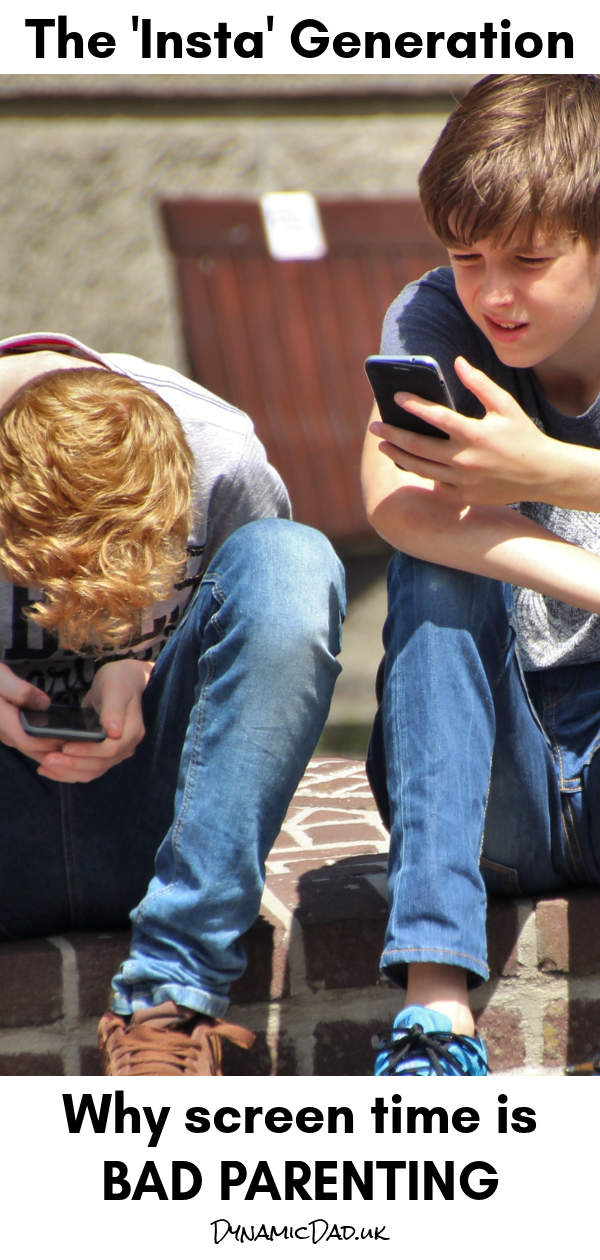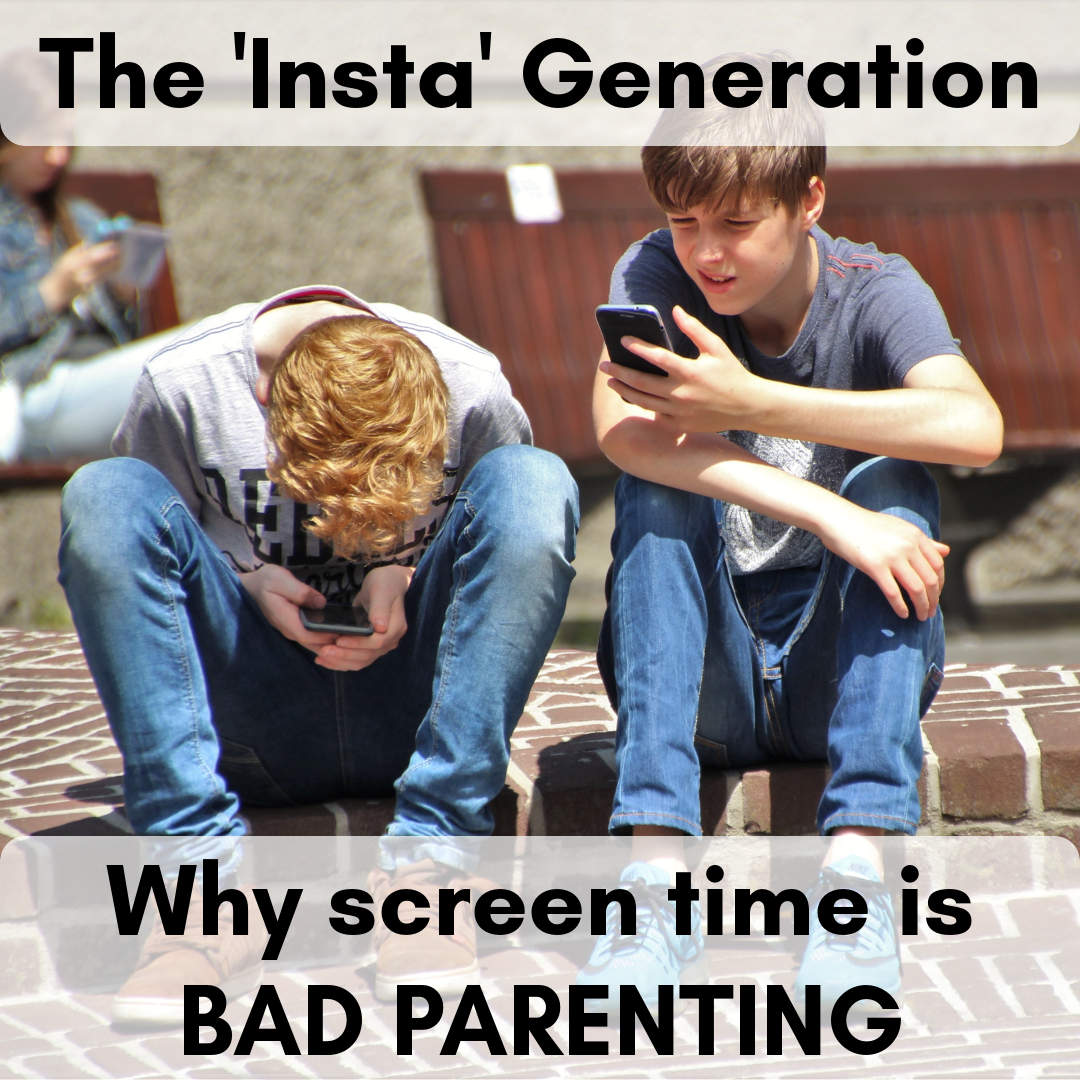Why screen time is bad parenting

The ‘Insta’ Generation
Kids are lonely, impatient and entitled. It could be your fault. This is why.
As technology advances, the way we use it changes. Computers started to become mainstream while I was a kid. TV’s started to become mainstream while my parents were kids.
These things profoundly changed the way families interacted and we had the rise of the TV babysitter and all the associated stigma.
Today it’s tablets and phones – but the problem has changed dramatically.
We live now in an ‘Insta’ world. A world where data is fast and cheap, and instantaneous results are expected and demanded. If a mobile site takes more than 3 seconds to load, more than 50% of us will navigate away and look elsewhere for our information fix or funny cat meme.
Our children are growing up in this world – and expect and demand instant results.
The problem is, it’s not real life.
To get good at something, one has to study, practice and test their knowledge. Results aren’t instant.
This is on the one hand causing our children to believe they aren’t good enough – because the can’t do it now – and so they stop trying. On the other hand, they demand our instant and full attention, and become either increasingly more vocal and aggressive about getting it, or fully introverted and isolate themselves from us.
The issues for our children don’t stop there.
Early brain development is driven by the abundance, or lack, of environmental stimuli. Excess exposure to screen based technology (TV, tablet, phone etc.) has been linked to deficits in attention and executive function, impulsive behaviour, decreased self-regulation ability (such as tantrums) and impaired learning ability. Not only that, but movement and engaged activity boosts learning and development and as you don’t really have to move when using a screen, development can be delayed. Childhood obesity is another factor, and chances increase by as much as 30% for those children with a device in their own room.
This is all pretty scary stuff. Yes, being able to stick Hey Duggee on the tablet to occupy them for 20 minutes is a ‘lifesaver’… but considering all the detrimental impact potential from letting them watch episode after episode, it’s not worth it. Even if you do manage to clean the whole house without interruption.
As they get older, the problems can intensify.
Teens now are spending less time going out & dating than they were 10 years ago, and it was less then than it was 10 years prior to that. Now, children and teens hang out online. They also feel more lonely – especially as a result of an event they were not invited to, that was widely documented across social media by those who were.
“Like the increase in loneliness, the upswing in feeling left out has been swift and significant. This trend has been especially steep among girls. Forty-eight percent more girls said they often felt left out in 2015 than in 2010, compared with 27 percent more boys.” ~ The Atlantic
A big part of this is feelings of rejection when they see or hear of their friends gathering without them, or when not getting enough ‘likes’ on their social media posts.
Cyberbullying makes headlines often, while in the background depression is on the rise – rapidly – as are suicide rates in teens.
“Girls have also borne the brunt of the rise in depressive symptoms among today’s teens. Boys’ depressive symptoms increased by 21 percent from 2012 to 2015, while girls’ increased by 50 percent—more than twice as much. The rise in suicide, too, is more pronounced among girls. Although the rate increased for both sexes, three times as many 12-to-14-year-old girls killed themselves in 2015 as in 2007, compared with twice as many boys. The suicide rate is still higher for boys, in part because they use more-lethal methods, but girls are beginning to close the gap.” ~ The Atlantic
None of this paints a great future for our children, and as you can see, technology is possibly not as helpful as it appears – it’s all down to how you use it.
The bigger problem though, is the parents – yes, you and me.
We too have become used to instant results, so when our child doesn’t immediately do as asked, correctly and to the desired standard we’re quick to chastise.
We have to step back and understand that results take time. This is especially true for someone learning a completely new task, and one they can’t relate to something they already know how to do.
We also need to step away from the screens. I’ve seen it and I’ve been it – the parent at the park with their eyes glued to their phones and kids nagging for them to come and play.
Remember – our children will do as we do far more than they will do as we say. If they see us glued to our devices, they will understand this to be normal – despite any advice to the contrary, and this is a huge risk to them given what we’ve read above.
It also raises the question of parental attachment and involvement – or rather a lack of it from the child’s perspective. If the child does not feel the parent is attached enough to them – because their attention is attached to the device in their hand, the child will seek attachment elsewhere – a screen of their own.
These are things that we need to help our children overcome – and fast – but of course the only way to really do this is to remove or reduce the sources of instant feedback and gratification, so they get used to having to be patient, to working for the desired results and to not being the highest priority all the time.
What to do?
We as parents need to create an environment for them that encourages growth, learning and play. Check out this post for more on how to raise smarter kids..
Our responsibility is to keep them safe and healthy. Happiness is their responsibility, although we do need to teach them how to achieve it. Thankfully, it isn’t hard or expensive, it doesn’t involve the latest toys or gadgets and it isn’t at all time consuming.
Play with them
 Spend 10-15 minutes at a time getting down on the floor and driving the Matchbox car through the sitting room carpet jungle with them. This will help them engage their imagination – which will then enable them to play on their own for longer, and allow you to get the cleaning done without burning their brains with cartoons.
Spend 10-15 minutes at a time getting down on the floor and driving the Matchbox car through the sitting room carpet jungle with them. This will help them engage their imagination – which will then enable them to play on their own for longer, and allow you to get the cleaning done without burning their brains with cartoons.
Try to have your child lead the activity – you are playing with them, not them playing with you. If you’re both a little stuck at first, create a jar full of ideas to choose from – written on lollipop sticks or small, colourful notepaper for example. Once the imagination has been kick started though you’ll find you rarely use the jar any more.
The simplest toys and props are best – they can be absolutely anything and the only limit is the imagination. Wooden blocks, Lego and similar construction toys are far better than the latest all singing, all dancing themed and branded action figure or electric car. Remember, an old cardboard box can be anything in the world – or out of it! For more play ideas, see How to REALLY up your Dad Game.
Let them fail.
We never want to see our children fail, ever.
But, if we don’t let them fail, how will they learn?
Not doing homework and losing break time or getting detention is a valuable life lesson if it means they learn to pay the mortgage on time and not lose the house.
Roll the clock back and it would have been debtor’s prison. They’ve got it easy!
Let them fail, help them learn from it.
Let them solve their own problems.
Children can be really resourceful.
We’ve all walked into a room at some point to see one thing stacked on top of another in order to reach the shelf with the snacks, so we know that left to their own devices they can and will come up with the solution.
Let them. (Just do it in a supervised way!)
Let them play with others.
This is possibly one of the hardest, yet most rewarding ones. Research has shown repeatedly that spending time with others is beneficial to psychological well-being, whereas time on social media can lead to feelings of jealousy and envy of others’ supposedly more successful and happier lives.
Many studies have demonstrated the value of social skills, so much so that they can be considered the key to a prosperous future. To lead, you have to be able to convince people to follow – these are your social skills. Combine them with the intelligence to make the ‘right’ decision, and you have a future CEO or world leader on your hands.
“Leadership requires you to be socially adept. In fact, your social skills may be just as important as your intelligence when it comes to achieving success” ~ American Journal of Preventive Medicine
They will only develop these skills by interacting with others – so create that environment for them. Arrange play dates with a group of like-minded parents, with benefits for you and the kids. You can increase your social circle, and the benefits that it brings, and you could also take turns to take the tykes solo – so you each get some kid-free time.
Why is it one of the hardest ones? Because we convince ourselves we “don’t have time” and “can’t cope with that many at once”. For their collective sake, we need to suck it up.
Let them be bored.
“Don’t always stress about providing something for your kids to do. Boredom won’t kill them ― it will actually make them stronger.” ~ American Journal of Preventive Medicine
A lot of us feel the pressure of finding something for our kids to do. I know I do. When I think about it though, my parents didn’t do this for me as much as I’m trying to do it for my kid.
Let’s all take a step back – we know they can be resourceful when there’s a task to achieve. Let them come up with the task on their own. Don’t always give them a screen or take them to the park.
They will soon allow their interests to take over and start exploring their environment and creating their own fun. Their need for instant gratification will wane too – and so will yours.
“Families [overly] centered on children create anxious, exhausted parents and demanding, entitled children. We parents today are too quick to sacrifice our lives for our kids. Most of us have created child-centered families, where our children hold priority over our time, energy and attention.” ~ American Journal of Preventive Medicine
Give them responsibility.
There are plenty of things to do around the home, and many hands make light work. Not only that, but they will learn the value of work and it will boost their self-esteem. High self esteem is linked to your perception of your contribution – so by being a big contributor, you feel greater self worth. Give your children that opportunity with age appropriate chores – and not just cleaning or tidying their own room.
Don’t bribe or reward every time though – you don’t want them growing up thinking they deserve a reward for doing the things they are expected to do.
Set screen time limits.
As most children have technology time in school right from primary or sometimes earlier, they really don’t need additional screen time at home.
Recently the UK’s chief medical officers published recommendations to reduce & even ban screen time for kids. See The Guardian article here.
This is also a policy followed by Silicon Valley executives, even Steve Jobs limited his kids’ screen time.
As significant effects on mental health and sleep manifest after two or more hours per day of screen time, the table below was developed as a collaboration of a number of children’s medical authors & doctors in conjunction with the American Academy of Pediatrics and the Canadian Pediatric Society.

‘Acceptable’ use could be for long car journeys, waiting rooms before appointments and all day events – like a siblings football tournament for example. Even then though, you could take along a book, puzzles or encourage art – such as a portrait of their sibling playing.
Whatever rules you choose to set, apply them to yourself too.
“Nearly one-third of children feel unimportant when their parents use their cell phones during meal times, conversations, TV watching and playing outside, according to a recent study. A June study by AVG Technologies surveyed more than 6,000 children, ages 8 to 13, from Brazil, Australia, Canada, France, The United Kingdom, Germany, The Czech Republic and the United States.
The survey discovered that 32 percent of children felt unimportant when their mums and dads were distracted by their phones. The kids said they had to compete with technology for their parents’ attention, and 28 percent of mothers and fathers agreed with this observation.” ~ American Journal of Preventive Medicine
Put your phone away when they get home from school, and don’t get it out again until they’ve gone to bed.
Create and stick to bedtime routines.
Routines have been proven to relieve anxiety and stress. Particularly when applied to bedtime, they can encourage better and longer sleep.
Set bedtimes and stick to them,
“A loss of one hour of sleep is equivalent to [the loss of] two years of cognitive maturation and development” ~ Time.com
…this is a heavy price for your child.
Tied in with the above;
“Surveys show that teens who spend three or more hours a day on electronic devices are 28 percent more likely to get less than seven hours of sleep than those who spend fewer than three hours, and teens who visit social-media sites every day are 19 percent more likely to be sleep deprived.
A meta-analysis of studies on electronic-device use among children found similar results: Children who use a media device right before bed are more likely to sleep less than they should, more likely to sleep poorly, and more than twice as likely to be sleepy during the day.” ~ The Atlantic
Your child’s education cannot afford this. Ensure they sleep at night so they can be alert and learn during they day.

OK, so they’re not all bad, but to give your child the best chance in life you seriously need to consider limiting their screen time.
You have at most 18 years to teach your children how to be the best they can be, you are the key to their future.
Make every moment count, put down the gadgets and show them how to win at life.










What a great post! I will share and tweet aloud, foryou are spot on! Thank you! #thatfridaylinky xoxo
Hi Lisa, thank you – I hope the message gets through to the parents with kids that need it most!
THIS IS AN AMAZING POST! I’m so glad you shared the link with me. I have no children, but I couldn’t agree with your post more. I was raised with access to no electronic. We were locked outside an told to go play and explore. When we insisted we were bored, our parents would gicves us chores to work on. Today’s day in age, I feel people would say that is too harsh of parenting. I couldn’t be more grateful to my parents for raising me that way. It has paid off in as an adult, me being resourceful and possessing true grit..in fact all of my siblings do. I think parents are too soft on their kids now which is why so many are now always complaining and entitled instead of working hard and finding a solution. I could talk on this subject for hours.
Thanks for sharing this post.
Hi Hannah, thanks! Yes, I see it a lot too – unfortunately as you say soft-touch parenting can lead to the kind of entitlement we’re starting to see. Boundaries and challenges are what we, rather they, need.
Your so right about wanting things instantly . Us parents as guilty as the kids. Screen time limits and healthy bedtime routine are so very important #blogcrush
We really are! If we understand why and take steps to work on it though, we’ll create a healthier environment for us and the kids.